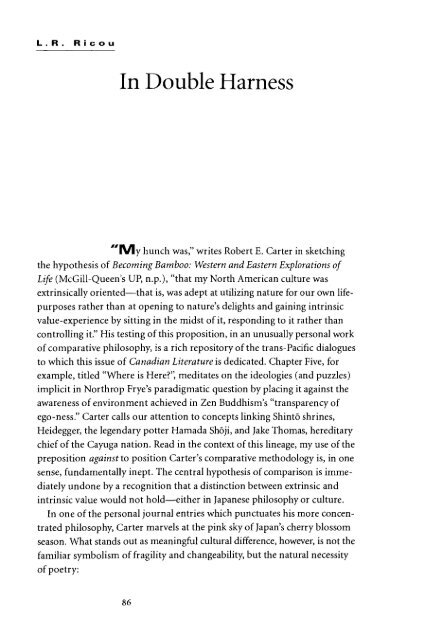To All Appearances A Lady - University of British Columbia
To All Appearances A Lady - University of British Columbia
To All Appearances A Lady - University of British Columbia
You also want an ePaper? Increase the reach of your titles
YUMPU automatically turns print PDFs into web optimized ePapers that Google loves.
L . R .<br />
R i c o u<br />
In Double Harness<br />
"IVIy hunch was," writes Robert E. Carter in sketching<br />
the hypothesis <strong>of</strong> Becoming Bamboo: Western and Eastern Explorations <strong>of</strong><br />
Life (McGill-Queen's UP, n.p.), "that my North American culture was<br />
extrinsically oriented—that is, was adept at utilizing nature for our own lifepurposes<br />
rather than at opening to nature's delights and gaining intrinsic<br />
value-experience by sitting in the midst <strong>of</strong> it, responding to it rather than<br />
controlling it." His testing <strong>of</strong> this proposition, in an unusually personal work<br />
<strong>of</strong> comparative philosophy, is a rich repository <strong>of</strong> the trans-Pacific dialogues<br />
to which this issue <strong>of</strong> Canadian Literature is dedicated. Chapter Five, for<br />
example, titled "Where is Here?", meditates on the ideologies (and puzzles)<br />
implicit in Northrop Frye's paradigmatic question by placing it against the<br />
awareness <strong>of</strong> environment achieved in Zen Buddhism's "transparency <strong>of</strong><br />
ego-ness." Carter calls our attention to concepts linking Shinto shrines,<br />
Heidegger, the legendary potter Hamada Shôji, and Jake Thomas, hereditary<br />
chief <strong>of</strong> the Cayuga nation. Read in the context <strong>of</strong> this lineage, my use <strong>of</strong> the<br />
preposition against to position Carter's comparative methodology is, in one<br />
sense, fundamentally inept. The central hypothesis <strong>of</strong> comparison is immediately<br />
undone by a recognition that a distinction between extrinsic and<br />
intrinsic value would not hold—either in Japanese philosophy or culture.<br />
In one <strong>of</strong> the personal journal entries which punctuates his more concentrated<br />
philosophy, Carter marvels at the pink sky <strong>of</strong> Japan's cherry blossom<br />
season. What stands out as meaningful cultural difference, however, is not the<br />
familiar symbolism <strong>of</strong> fragility and changeability, but the natural necessity<br />
<strong>of</strong> poetry:<br />
86

















